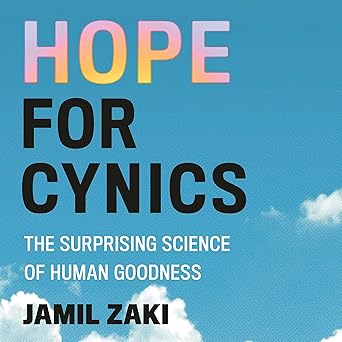
We've all been there - feeling hopeless and disheartened with the state of the world. It's easy to fall into a cycle of cynicism, where we question the goodness in people and the world around us. But what if I told you that there's a way to break free from this toxic mindset? Stanford Psychologist Dr. Jamil Zaki believes that cynicism is a disease that can be cured, and it's time to expose its symptoms and find a solution.
For thousands of years, humans have debated whether we're inherently selfish or generous, kind or cruel. But recent studies suggest that our views on human nature have shifted dramatically. In 1972, half of Americans believed that most people could be trusted, but by 2018, only a third shared this optimism. Different generations, genders, and ideologies all seem to be at odds, with each group convinced that human virtue is disappearing. But what if we've been relying on the wrong model of human behavior? When we expect the worst from others, we often bring it out of them. Cynicism not only makes us sick, but it also exacerbates social problems by altering the way we perceive the world. By studying the symptoms of cynicism and the effects it has on our behavior, Dr. Zaki offers a compelling alternative.
Through a combination of science and storytelling, Dr. Zaki reveals the secret to beating back cynicism: hopeful skepticism. This approach doesn't imply blind faith in every individual or politician, but rather a critical and nuanced understanding of people and the world. By being more precise in our thinking, we can build a more balanced and realistic picture of human nature. The question is, are we willing to shake off our cynicism and try a new approach? By doing so, we can take the first steps towards building a world that aligns with our values and aspirations.
I just finished reading a book that has left me feeling hopeful and inspired. The author, a Stanford Psychologist, shares his journey of facing his own cynicism and explores a way out of this toxic mindset that's hard to overcome. As someone who's struggled with feelings of despair and disconnection from the world, I found this book to be both a personal and universal exploration of human nature.
The author's main argument is that cynicism is a disease that can be cured, and he provides a compelling case for hopeful skepticism as a more effective approach. He draws on a wide range of studies and examples to illustrate how our expectations of others can shape their behavior and lead to more problems. I was struck by how the author's point of view on human nature aligns with my own experiences and observations. At times, I felt like I was seeing the world through fresh eyes, and it was incredibly liberating. The author also shares his own personal struggles with cynicism and how he ultimately found a way to overcome it, which made me feel like I'm not alone in this struggle.
What I found most powerful about this book was its ability to shift the way I think about the world and my place in it. The author's approach is not about blind optimism or naive idealism, but about cultivating a more nuanced and realistic understanding of human nature. By being more precise in our thinking, we can build a more balanced and compassionate picture of the world. I left this book feeling more hopeful and energized, with a renewed sense of purpose and determination to make a positive impact in my own life and community. I would highly recommend this book to anyone who's struggling with cynicism or feeling disconnected from the world around them.
Rating: 5.0 / 5.0
Reading this book was a life-changing experience, it made me feel hopeful and inspired about the state of the world. The author, a Stanford Psychologist, shares his journey of fighting his own cynicism and explores a way out of this toxic mindset that's hard to overcome. The author's main argument is that cynicism is a disease that can be cured, and he provides a compelling case for hopeful skepticism as a more effective approach. The author's point of view on human nature aligns with my own experiences and observations, and it was incredibly liberating. I left the book feeling more hopeful, energized, with a renewed sense of purpose and determination to make a positive impact in my life and community. I would highly recommend this book to anyone who's struggling with cynicism or feeling disconnected from the world. This book has the power to shift the way we think about the world and our place in it, and I'm grateful to have read it.